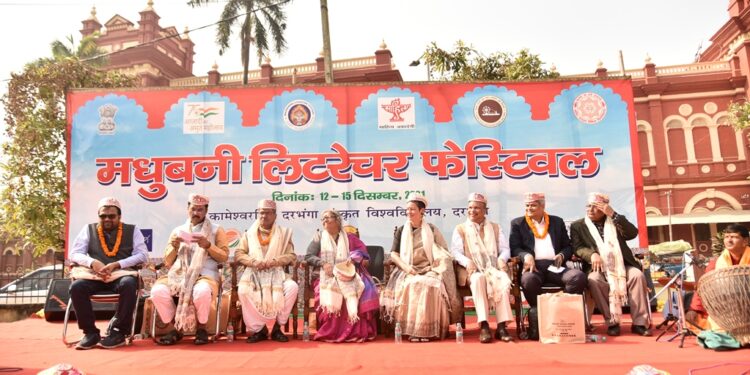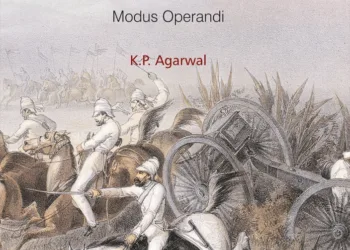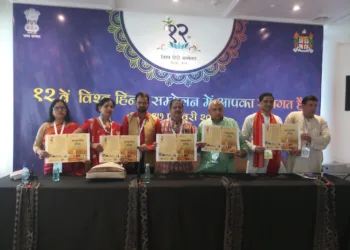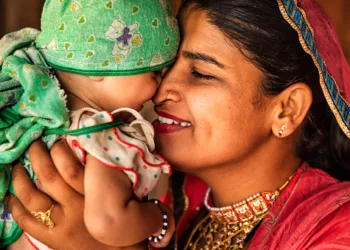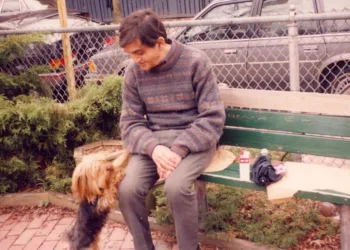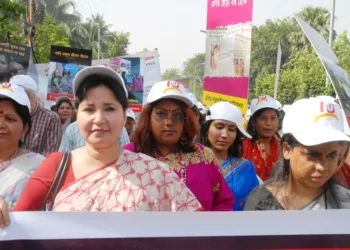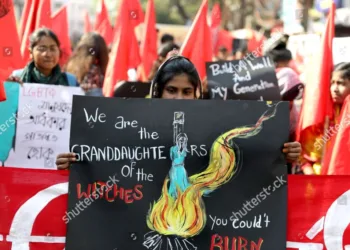Dr Savita Jha Khan
Madhubani Literature Festival (MLF) is a flagship programme of the Delhi-based Centre for Studies of Tradition and Systems (CSTS). It has been organizing Madhubani Literature Festival since 2018 to underscore the literary, cultural, and traditional values of the land. MLF 2021 was the fourth edition for which Darbhanga, a historical and cultural seat of the core values of the body politic known as Mithila, was chosen the venue. The festival was held from 12th December to 15th December 2021, at Kameshwar Singh Darbhanga Sanskrit University (KSDSU), Darbhanga, Bihar.
MLF-21 provided a platform for a discourse of knowledge traditions, archiving manuscripts,publication of scholarly works, Gandhian ideas, rural upliftment, promotion of Maithili and other vernacular languages and literature, women’s empowerment, heritage conservation, promotion of (Mithila) folk art and craft, Indo-Nepal cultural bond and environmental concerns.
The festival was held in collaboration with Gandhi Smriti and Darshan Samiti, New Delhi, Central Institute of Indian Languages (CIIL), Mysore, Sahitya Akademi, New Delhi, Delhi College of Arts and Commerce (DCAC), University of Delhi, Lalit Narayan Mithila University (LNMU), Darbhanga, Kameshwar Singh Darbhanga Sanskrit University, Darbhanga and India’ Foundation, New Delhi.
Four-Day Programme
The four-day event was inaugurated on 12th of December at Kameshwar Singh Darbhanga Sanskrit University (KSDSU) campus by Padma Shree Usha Kiran Khan, Shashinath Jha, Vice Chancellor, KSDSU, Milinda Moragoda, Sri Lankan High Commissioner to India, and his wife Jennifer Moragoda, Ramanath Jha, Professor, JNU, Mushtaq Ahmed, Registrar, LNMU, Narayan Chaudhary, Professor, Assistant Director, CIIL, and Shri Sanjay Saraogi, MLA Darbhanga.
A dance performance on ‘Jai Jai Bhairavi’, considered an anthem of Mithila, was the main attraction of inauguration ceremony. Ramnath Jha, professor in JNU School of Sanskrit and Indic Studies, delivered the keynote address. Later the book – “Aripan: Mapping Mithila in South Asia” was launched. This book contains scholarly articles on the social, cultural, literary, geographical, and ancient dimensions of Mithila.
Amresh Pathak Smriti Samman 2021 was announced for the exceptional contribution in the social upliftment of Mithila. Dr Prashant received this honour for his selfless contributions during COVID-19 times. This was the second time Amresh Pathak Smriti Samman was conferred with an appreciation certificate along with Rs 25000 as prize money by MLF. The lifetime achievement award of ‘Vaidehi: Sita Beyond the Body’, an international exhibition, was awarded to three senior artistes.
Veena. C. Seshadri, a Bharatnatyam dance exponent, performed the Sita ballad followed by Vedic chants by female participants, which marked the rejuvenation of the inherent Gargi and Vaidehi tradition of the land. Later, Rebel Theatre took the stage for a magnificent fusion singing performance, held under “YuvaSahiti”, platform for involvement of youth in carrying forward the cultural and literary legacy.
There were discussion sessions on “Maithili Sahitya Mei Pathkiya Samasya”, “Stree Dalan”— Streevimarsh, apart from a four-day symposium, “Maithili: Language Mapping Beyond the Boundaries”. It was organised in collaboration with CIIL, Mysore. The sessions attended by Professor Gangaram Jha, Ajit Azad, Dr. Bheemnath Jha, Mala Jha, Dr. Ramanand Jha ‘Raman’, Smita Jha, Prof Ramavtar Yadav (keynote speaker), Prof Shashinath Jha, Shri Ramchaitanya Dheeraj, Prof Sushant Kumar Mishra, Shri Devendra Mishra, Prof Girishnath Jha, Prof Ramnath Jha, Prof Narayan Choudhary, Dr Deepamani Holai, Prof Krishan Mohan Jha, Dr Mithilesh Jha, Pt. Bhavnath Jha, Prof Kamla Choudhary, Prof Devshankar Naveen, Dr Arunabh Saurabh. Priyeshi Kumari, Preetam Nishad, Bheemnath Jha and Gangaram Jha discussed the commotion among readers and the sullen attitude of reading among contemporary readers towards literature while talking on “Maithili Sahitya Mei Pathakiya Samsya”. At the “Stree Dalan” Nivedita Jha from Patna, Mala Jha, Ranju Jha from Banaras and Rani Jha from Madhubani represented the empowered women, excelling in different walks of life along with their respective domestic spaces.
Apart from the academic sessions and cultural events, there were the stalls appealing to the five senses. There was folk art (Madhubani paintings, Sikki art, laah bangle), delicious traditional food accompanied with achar and papad, a variety of books, and sound of Vedic chants and folk music. Major publication houses, like National Book Trust, Vani Prakashan, Sasta Sahitya Mandal, Sahityiki, and Kilkari participated.
On December 13, the day’s events began with Baal Sahiti, followed by a session on regional films – “Maithili Talkies”— in which in which Satyendra Jha and Shyam Baskar were the speakers. The session was moderated by Gangesh Mishra. The emphasis was on regional film-making and its reception. Satyendra Jha, a significant figure in the field of Maithili cinema, pointed out the difficulties regional cinema faced in terms of distribution. There was, however, a ray of hope for regional cinema on different social media platforms and the rising genre of short films. There was a session on philosophy and spiritualism of the land –“Maati ke Darshan”, where Ram Nath Jha, Sushant Mishra, Rita Singh and Binayanand Jha spoke. Ramnath Jha underscored the value of Mithila’s Nyaya tradition and suggested that we need to revisit and restore the intellectual tradition of scholarly figures like Ayachi Mishra, Mandan Mishra, Vachaspati and Gangesh. Rita Singh elaborated on the Mithila’s tradition through her extraordinary knowledge of Angika, Bajjika (Vajjika) and Maithili. Pradeep Kant Choudhary, Bhogi Mahato, Shreesh Choudhary, Mithlesh Jha, and Manindranath Thakur, shed light on the idea of “ashram” as well as the relevance of Gandhi’s ideas and ideals in contemporary time during the session- “Ashram: Gandhian Idea”.
There were sessions on culturally extinct kokti cotton – “Mithila Weaves: on kokti” and “Textile Tradition: challenges and possibilities”. In the “Mithila Weaves on Kokti” session, Pt. Bhavnath Jha and Pradeep Kant Choudhary deliberated on the kokti weaving tradition and underlined the example of sixteen-meter yard of taag given by Darbhanga Raj. In the “Textile Tradition: Challenges and Possibilities” session, Jennifer Moragoda (Sri Lankan High commissioner’s wife and an author), in conversation with Pradeep Kant Choudhary discussed the various opportunities in the textile industry.
On the evening of the second day, Padma Shree Ram Gopal Bajaj along with renowned actress Kanupriya Shankar Pandit recited “JaiSePahine: SiyaPiyaKatha”. The day concluded with showers of wonderful poems during Kavi Sammelan by Bibha Jha, Krishna Mohan Jha, Chandramani Jha, Bheemnath Jha, Phool Chandra Jha ‘Praveen’, Dr Rani Jha, Manikant Jha, Preetam Nishad, and Uday Chandra Jha ‘Vinod’, moderated by Ashok Mehta.
On the third day of the festival on December 13, there were session on “In Reverence: Sita Beyond the Boundaries”, “Pathakiya Sanskriti: Dasha or Disha”, “Sita Puni Boli”, “Itihaske Pannose”, “Vidyapati Ke Mithila”, “Jal, Jan or Jeevan”, “Adaptations of Literature in Cinema”, “The Hindutva Paradigm”, “Pravasi: Yatri and his Language Diversity”. The speakers of the session “Sita Beyond the Boundaries” were Milinda Moragoda (Sri Lanka), Ram Madhav (India), and Roushan Das (Nepal). The speakers from three different countries discussed common cultural ties among the countries as well as underlined the significance of Devi Sita in their respective countries. In the session on “Sita Puni Boli”, Asha Prabhat, Manzar Suleman and Rupa Singh deliberated on the conventional, social, and cultural reception of Sita. Different facets of Sita were discussed – as a rebel, and as an independent figure. Asha Prabhat indicated at the “warrior” side of Sita, which is a contemporary attempt to revisit the idea of “Sita”. This session was moderated in Hindi by Kiran Jha. Further, there were sessions which focused on contemporary feminist concerns and practices. Along with Stree Dalan, a traditional space provided with re-orientation in spatial politics, women participated as speakers to discuss “Female voices”.
In the session “Jal, Jan or Jeevan,” Avanindra Jha emphasised that civilisations cultivated on the banks of rivers are affected due to reckless deforestation, neglect of water bodies and building of numerous dams. He also pointed out that the improper and insufficient development of water outlets leads to water logging in agricultural lands, which adversely affects the whole biodiversity.
Moving on from very serious environmental as well as economical concerns, another session- “Adaptation of Literature in Cinema” was organised. Ajeet Rai and Kumar Vimlendu discussed Indian cinema and world cinema in terms of adaptation in the session, “Adaptation of Literature in Cinema”. They mentioned adaptation of various Shakespearean works in Hindi cinema along with Satyajit Ray’s Bengali movies. RagasudhaVinjamuri presented a magnificent Bharatnatyam performance on “Naman Mithila”.
There was also a Dhrupad recital by Pandit Ram Kumar Mallik, Pandit Sahitya Mallik and Pandit Sangeet Mallik from Amta Gharana, Darbhanga. A fashion show, Ekvastra, under the supervision of Prakash Chandra Jha, a Germany based fashion designer, and conceptualised by Savita Jha Khan, showcased weavers and women in local weaving industry.
The last day of the festival, 15th December, started with the narration of Phanishwar Nath Renu’s and Usha Kiran Khan’s stories by Mona Jha. The session “Last Refuge: Darbhanga Raj” had Manzar Suleman and Mushtaq Ahmed as speakers.
(The writer is chairperson of Centre for the Studies of Tradition and Systems (CSTS) at Madhubani Literature Festival (MLF).)


